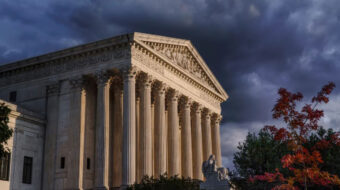As a longtime New Jerseyan and death penalty opponent, I was happy that New Jersey’s Legislature had the courage to establish a death penalty moratorium.
Meanwhile in California, a blind man in a wheelchair was executed at the age of 76. Tookie Williams, a former Los Angeles street gang leader, was executed recently after decades on death row despite an international campaign of protest, which included the town council of Graz, Austria, hometown of Calif. Gov. Arnold Schwarzenegger. A coalition of Social Democrats, Communists and Greens, representing a majority of the Graz council, took Schwarzenegger’s name off a 15,000-person sports stadium in spite of the protests of the conservative mayor, who boasted that he was the Sacramento Terminator’s personal friend.
The Graz mayor, while blaming the left for dishonoring Arnold, did make it clear that he was against the death penalty, as most Europeans, even those on the right, are. In the U.S. there are very few elected Communists, Social Democrats or Greens (of those few, the Greens have the most here) to create a modern political spectrum that will produce serious debate and diversity of the kind that compels conservatives to accept and endorse programs like abolition of the death penalty, reform of the penal code, and establishment of systems of socialized medicine.
Most Europeans see the continuation of the death penalty in the U.S. as barbaric and uncivilized, and they are right. The “barbarism” of the death penalty is an important part of the American right’s campaign to numb and brutalize public opinion, to get it to accept a brutal form of capitalism that Upton Sinclair defined a century ago in his novel “The Jungle.”
The death penalty is part of a culture of punishment and violence that is typically associated with repressive societies and regimes.
Over the last 30 years it has been widely extended in the U.S. while it has been abolished in the developed capitalist world.
In the U.S. the death penalty was illegal from 1972 to 1976, after the Supreme Court declared it to be a “cruel and unusual punishment.” In 1976, a more conservative court ruled that states had the right to re-institute the death penalty. A legion of right-wing politicians, running in both parties against the “permissiveness” of the 1960s, stampeded to do just that.
In ruling against plaintiffs who argued, based on massive evidence, that the death penalty was applied to African Americans in far greater numbers for comparable crimes than to white defendants, the Supreme Court in the Reagan years actually contended that such discrimination permeated the whole criminal justice system and if the death penalty were eliminated for that reason, other penalties would have to be revised — a comment on the racist nature of the legal system by its leading defenders.
When the Nazis came to power in Germany in 1933, they re-instituted beheading and other cruel and unusual punishments as part of a two-tier criminal “justice” system. Ordinary people routinely received very harsh penalties for minor crimes, while fascist bigwigs and their wealthy supporters violated the laws with the same impunity that Enron executives long enjoyed.
In the U.S., the death penalty is part of a two-tier criminal justice system which has incarcerated over 2 million people. This happens through drug laws which prosecute users, particularly minority users, not big dealers who buy protection and rake in super profits; through a system that arrests and deports undocumented immigrants and does nothing to the businesses that exploit them; through a system that permits Enron and WorldCom executives, when they get caught (and we should remember that in our “deregulated” economy a great many never do), to evade or at least seriously reduce prison sentences through legal maneuvers.
In Cuba, the death penalty is still on the books for crimes such as hijacking, but its use is quite rare. The last known execution there took place in 2003.
In the former Soviet Union, individuals who committed major economic crimes (such as embezzling large amounts of public funds) were sometimes given the death penalty. While I in no way advocate this anywhere, I sometimes think that if such a policy existed in the U.S., the death penalty would rapidly lose support among the corporate leaders who fund the right-wing politicians who defend and expand it.
The death penalty simply has no place in modern human society. That is understood in a range of countries from Great Britain to Japan. It is also understood by many millions of Americans. Its elimination in the U.S., through legislation that would restore and make permanent the Supreme Court’s temporary 1970s ban, should be a major goal for progressive activists. Getting rid of the death penalty most of all will help undermine the mindset that sees violence as the answer to violence and punishment without limits as society’s first line of defense, and is blind to the possibilities of rehabilitation and reform.
Norman Markowitz is a history professor at Rutgers University.












Comments